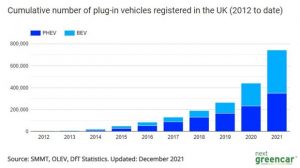Over the past five years there has been a significant increase in the demand for electric cars and light commercial vehicles as the global call for net zero emissions accelerates.
In 2021, over 175,000 new Electric vehicles (EVs) were registered on UK roads, a growth of 66% from 2019. Popular models such as the Tesla model 3 saw over 25,000 new registrations alone.
At the end of 2021, there were over 395,000 pure-electric cars on UK roads and more than 740,000 plug-in models including plug-in hybrids (PHEVs).

BEV (Battery Electric Vehicle) and PHEV (Plug-in Hybrid Vehicles).
Electric cars are now a viable mode of transport, offering many benefits to companies and individuals, as well as contributing to a cleaner environment. The benefits range from government grants, eligibility for cost free travel, ultra-low emissions, clean air zones and no congestion charges to reduced benefit-in-kind taxation. For a company car driver, shifting to an electric car could reduce their personal taxation significantly as electric cars (with a range of over 130 miles) are currently taxed at 2%. As an example, driving a two-litre diesel VW Passat as a company car might cost £350 per month in tax, while an electric car such as a Tesla Model 3 would cost £17 per month. Battery electric vehicles are also zero-rated for vehicle emissions tax (otherwise known as road tax).
Other benefits include lower running costs, reduced maintenance costs and lower noise pollution.
Government grants are available for both the car and the installation of electric charging points in homes. As part of the government’s green agenda, some new builds will have charging points pre-installed.
For any purchaser of an electric car, there is still some anxiety about the range or how far away the next charger may be. A typical electric car will have a range of 200-250 miles which should be sufficient for commuting and local trips before recharging at home. However, on longer trips, these cars need to be recharged via commercial charging stations which can vary in quality and charging rates. Tesla is leading the market on infrastructure support and charging rates. Other providers such as BP Pulse, Chargemaster and Genie are steadily improving their charging stations.
Private individuals are also choosing electric cars as an investment as the range available expands to include high performance models such as Porsche and Lamborghini. The Porsche Taycan offers supercar performance and a 225-mile range.
Asset finance companies are seeing strong demand for the financing of electric cars, with both hire purchase and leasing options being requested. Customers are keen to take advantage of the benefits shown above, however cars remain expensive when compared to their petrol and diesel equivalents. By using asset finance, customers can take advantage of the latest technology and benefits of electric vehicles whilst preserving their cashflow, spreading the cost of the asset and having fixed monthly payments.
Renaissance Asset Finance, a subsidiary of Arbuthnot Latham & Co., Limited has considerable experience of funding a wide range of vehicles. If you would like more information on the bespoke solutions we can offer for electric vehicle funding, please get in touch.




